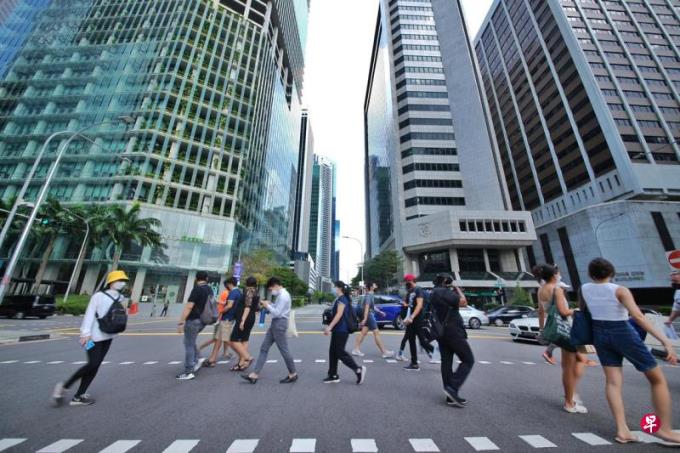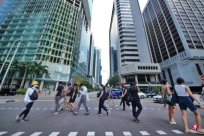
The estimated data released by the Ministry of Trade and Industry on Monday (October 14) shows that Singapore's total domestic product in the third quarter increased by 4.1%year -on -year, much higher than the 2.9%of the previous quarter, and exceeded the 3.8 of the economist's prediction of 3.8%, The fastest growth rate since the third quarter of 2022.However, whether this growth momentum can continue and full of uncertainty.
The wording used by the Singapore Financial Authority in the monetary policy statement on the same day shows a cautious attitude towards economic prospects and concerns about challenges and risks that may face the external environment.The statement refers to the possibility of "major uncertainty in economic prospects", including the possibility of a sharp upgrade of geopolitical risks and trade conflicts.In addition, the pace and impact of global macroeconomic policies have not been clear.
This is not worrying.The geopolitical situation is unstable, especially the tension between mainland China and Taiwan and the conflict of the Middle East. They all pose a threat to the global economy.The conflict between Israel and Hamas, which lasted for a year, has become increasingly upgraded, and more and more signs indicate that the scope of conflict is gradually expanding, and it may spread to the entire Middle East, and the market panic emotions are heating up.The World Trade Organization warned last week that the unstable situation in the Middle East has put pressure on economic activities and may disrupt important shipping routes.As an important global oil production area, if a large -scale conflict occurred in the Middle East, it may lead to soaring oil prices, pushing up global inflation, and a wide and far -reaching impact on the global economy.
In Asia, the situation in Northeast Asia is full of gunpowder.The Chinese PLA has recently held large -scale military exercises around Taiwan. The tension between North Korea and South Korea also shows signs of upgrading.After the South Korean drone entered the North Korean airspace and distributed leaflets, North Korea bombed some roads between the two countries, and the risk of military conflict rose.These geopolitical uncertainty may affect regional economic stability and further disturb the global supply chain.
In addition to geopolitical challenges, Singapore, as a highly open small economy, cannot be ignored in macroeconomic variables.The policy change after the US presidential election next month may change the global economic pattern.The US Federal Reserve was greater than the expected interest rate reduction last month, which led to a decline in the US dollar exchange rate. If other central banks shrink the international trade revenue from the US dollar, it also adopts corresponding policies, which may allow the world to enter an alley with inflation.In addition, whether a series of economic measures in China have recently launched can successfully boost market confidence.
Faced with the increasingly complex global economic environment, enterprises in various countries have adjusted their operating strategies to cope with changeable markets and uncertainty.Although Singapore's economic performance is relatively stable, it is difficult to avoid the impact of the global layoffs, and there is a disconnection between the employment market and economic growth.According to data from the Ministry of Human Management last month, the number of layoffs in the second quarter rose slightly to 3270, which rebounded for the first time after two consecutive quarters.The ratio of employees who returned to the workplace within six months, from 61.5%in the fourth quarter of last year to 59.4%of the first quarter of this year, and then fell to 55%in the second quarter, showing that more people need to be tailored for longerFind a job.
Since October, at least two companies have announced their layoffs. First, the consumer electronics giant Dyson has no warning layoffs, and then Samsung Electronics has announced the global layoffs, including Singapore.Earlier this year, companies such as logistics companies express their express delivery, e -commerce platform Higong, and electronic manufacturer Epson have also layoffs.
Technical change and structural transformation are one of the reasons for economic growth and the employment market.With the rapid development of artificial intelligence, automation, and digitalization, the business operation model has undergone tremendous changes, and many traditional jobs have gradually been eliminated, and the emergence of new positions often require employees to have new skills.The uncertainty of geopolitical turmoil and macroeconomics has exacerbated the instability of the employment market.It is necessary for Singapore to maintain flexibility in terms of policy to adapt to changes in the global economic environment and increase support in the field of skills improvement and re -training.
The government has launched a number of policies to encourage lifelong learning and skills improvement, and promote cooperation between enterprises and education institutions to ensure that training programs can keep up with market demand.Just as Deputy Prime Minister Wang Ruijie's "Future Transformation Working College" announced on Monday is set up for training manufacturing employees. It pays special attention to the training of artificial intelligence and sustainable development to cope with the changing pattern of manufacturing.Employees take the initiative to improve their skills. Enterprises have more flexibly adjusted their business strategies. Through joint efforts, Singapore will continue to maintain competitive advantages in the era of changing global economy.




